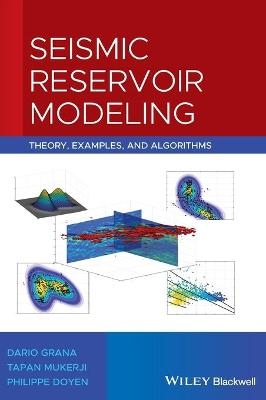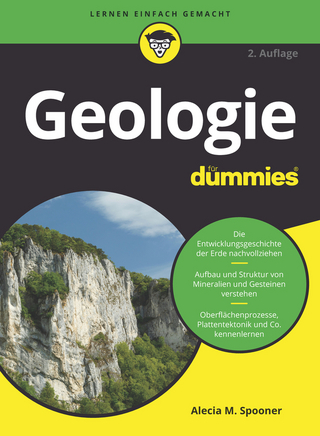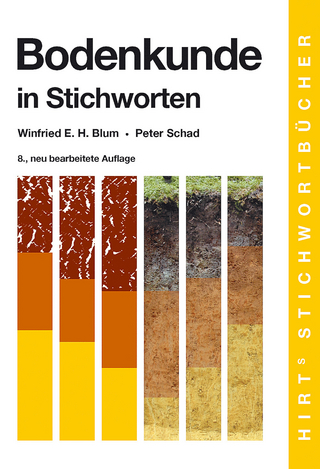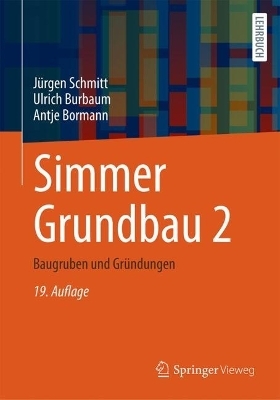
Seismic Reservoir Modeling
Wiley-Blackwell (Verlag)
978-1-119-08618-5 (ISBN)
Seismic Reservoir Modeling: Theory, Examples and Algorithms presents the main concepts and methods of seismic reservoir characterization. The book presents an overview of rock physics models that link the petrophysical properties to the elastic properties in porous rocks and a review of the most common geostatistical methods to interpolate and simulate multiple realizations of subsurface properties conditioned on a limited number of direct and indirect measurements based on spatial correlation models. The core of the book focuses on Bayesian inverse methods for the prediction of elastic petrophysical properties from seismic data using analytical and numerical statistical methods. The authors present basic and advanced methodologies of the current state of the art in seismic reservoir characterization and illustrate them through expository examples as well as real data applications to hydrocarbon reservoirs and CO₂ sequestration studies.
Dario Grana is an Associate Professor in the Department of Geology and Geophysics and in the School of Energy Resources at the University of Wyoming. Tapan Mukerji is a Research Professor in the Department of Energy Resources Engineering at Stanford University. Philippe Doyen is an independent consultant with worldwide responsibility for technology development in reservoir characterization.
Preface x
Acknowledgments xii
1 Review of Probability and Statistics 1
1.1 Introduction to Probability and Statistics 1
1.2 Probability 3
1.3 Statistics 6
1.3.1 Univariate Distributions 6
1.3.2 Multivariate Distributions 12
1.4 Probability Distributions 16
1.4.1 Bernoulli Distribution 16
1.4.2 Uniform Distribution 17
1.4.3 Gaussian Distribution 17
1.4.4 Log-Gaussian Distribution 19
1.4.5 Gaussian Mixture Distribution 21
1.4.6 Beta Distribution 23
1.5 Functions of Random Variable 23
1.6 Inverse Theory 25
1.7 Bayesian Inversion 27
2 Rock Physics Models 29
2.1 Rock Physics Relations 29
2.1.1 Porosity – Velocity Relations 29
2.1.2 Porosity – Clay Volume – Velocity Relations 31
2.1.3 P-Wave and S-Wave Velocity Relations 32
2.1.4 Velocity and Density 33
2.2 Effective Media 34
2.2.1 Solid Phase 34
2.2.2 Fluid Phase 39
2.3 Critical Porosity Concept 43
2.4 Granular Media Models 44
2.5 Inclusion Models 46
2.6 Gassmann’s Equations and Fluid Substitution 51
2.7 Other Rock Physics Relations 56
2.8 Application 60
3 Geostatistics for Continuous Properties 66
3.1 Introduction to Spatial Correlation 66
3.2 Spatial Correlation Functions 70
3.3 Spatial Interpolation 77
3.4 Kriging 79
3.4.1 Simple Kriging 80
3.4.2 Data Configuration 85
3.4.3 Ordinary Kriging and Universal Kriging 88
3.4.4 Cokriging 90
3.5 Sequential Simulations 94
3.5.1 Sequential Gaussian Simulation 94
3.5.2 Sequential Gaussian Co-Simulation 100
3.6 Other Simulation Methods 102
3.7 Application 105
4 Geostatistics for Discrete Properties 109
4.1 Indicator Kriging 109
4.2 Sequential Indicator Simulation 114
4.3 Truncated Gaussian Simulation 118
4.4 Markov Chain Models 120
4.5 Multiple-Point Statistics 123
4.6 Application 127
5 Seismic and Petrophysical Inversion 129
5.1 Seismic Modeling 130
5.2 Bayesian Inversion 133
5.3 Bayesian Linearized AVO Inversion 135
5.3.1 Forward Model 135
5.3.2 Inverse Problem 137
5.4 Bayesian Rock Physics Inversion 141
5.4.1 Linear – Gaussian Case 142
5.4.2 Linear – Gaussian Mixture Case 143
5.4.3 Non-linear – Gaussian Mixture Case 146
5.4.4 Non-linear – Non-parametric Case 149
5.5 Uncertainty Propagation 152
5.6 Geostatistical Inversion 154
5.6.1 Markov Chain Monte Carlo Methods 156
5.6.2 Ensemble Smoother Method 157
5.6.3 Gradual Deformation Method 159
5.7 Other Stochastic Methods 163
6 Seismic Facies Inversion 165
6.1 Bayesian Classification 165
6.2 Bayesian Markov Chain Gaussian Mixture Inversion 172
6.3 Multimodal Markov Chain Monte Carlo Inversion 176
6.4 Probability Perturbation Method 179
6.5 Other Stochastic Methods 181
7 Integrated Methods 183
7.1 Sources of Uncertainty 184
7.2 Time-Lapse Seismic Inversion 186
7.3 Electromagnetic Inversion 188
7.4 History Matching 189
7.5 Value of Information 192
8 Case Studies 194
8.1 Hydrocarbon Reservoir Studies 194
8.1.1 Bayesian Linearized Inversion 194
8.1.2 Ensemble Smoother Inversion 198
8.1.3 Multimodal Markov Chain Monte Carlo Inversion 203
8.2 CO2 Sequestration Study 206
Appendix: MATLAB Codes 211
A.1 Rock Physics Modeling 211
A.2 Geostatistical Modeling 213
A.3 Inverse Modeling 217
A.3.1 Seismic Inversion 218
A.3.2 Petrophysical Inversion 220
A.3.3 Ensemble Smoother Inversion 223
A.4 Facies Modeling 226
References 229
Index 242
| Erscheinungsdatum | 08.07.2019 |
|---|---|
| Verlagsort | Hoboken |
| Sprache | englisch |
| Maße | 189 x 246 mm |
| Gewicht | 652 g |
| Themenwelt | Naturwissenschaften ► Geowissenschaften ► Geologie |
| ISBN-10 | 1-119-08618-3 / 1119086183 |
| ISBN-13 | 978-1-119-08618-5 / 9781119086185 |
| Zustand | Neuware |
| Informationen gemäß Produktsicherheitsverordnung (GPSR) | |
| Haben Sie eine Frage zum Produkt? |
aus dem Bereich


